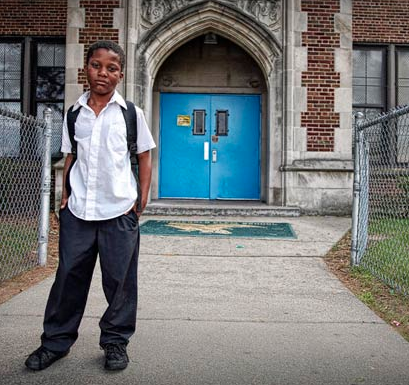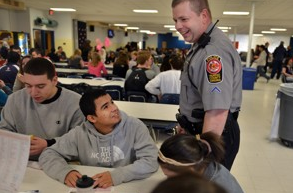News & Announcements
- Details
- Written by Joshua Wachtel
According to Nirvi Shah, writing for EdWeek:
A panel of school safety, climate, and security experts quizzed by a House committee today largely agreed that schools need more counselors, better communication between adults on campus and students, and additional, thoughtful emergency planning.
One thing they don't need, according to the experts: Teachers carrying guns to class.
Shah quotes David Osher of the American Institutes for Research, who she calls a "school climate guru": "The real challenge in schools is not the low-incidence and very traumatic events we want to prevent. It's low-level aggression that takes place persistently."
Shah points out that "Combating that, and ultimately preventing more serious events, begins with forming trusting relationships between students and adults, especially school resource officers and counselors." [emphasis added]
The complete article can be found here.
- Details
- Written by Joshua Wachtel
On Februrary 6 there was an interesting bit of news from the Restorative Justice Council, which notes a recommendation in a recent U.K. government report that restorative justice presents a "rich avenue for improving the handling of police complaints." The report also recommends, "The Commission should set out best practice protocols for their use in appropriate cases and the use of informal or local resolution systems should be independently monitored to ensure that it is not used inappropriately in relation to conduct that would justify criminal or disciplinary proceedings."
- Details
- Written by Joshua Wachtel
IIRP, which is based in Bethlehem, Pennsylvania, has been working with the local Bethlehem Area School District the past two years to implement restorative practices at two large high schools and at other schools in the district. Lehigh Valley PBS TV (Public Broadcasting System) included a five minute segment about the implementation in a recent 30-minute program called Tempo, which focused on the question of bullying in schools. The segment includes interviews with IIRP instructor Mary Jo Hebling and examples of how restorative circles are being used by teachers in classes.
- Details
- Written by Joshua Wachtel
On her blog this weekend, Lorenn Walker posted a piece about what she sees as the significance of the restorative justice conference used at the pre-sentencing phase of the Ann Grosmaire murder case. Here's an excerpt from her piece, with links preserved:
[Paul] Tullis’s article [in the New York Times Magazine] made an important contribution by describing how restorative justice can be used at the plea agreement stage of a murder case, by “vividly tell[ing] the story from the perspectives of the different parties that took part in the process” as pointed out by Hadar Aviram, law professor at the University of California Hastings College of Law in San Francisco.
- Details
- Written by Joshua Wachtel
This video is from American Humane, which formerly housed the National Center on Family Group Decision Making, now a part of the Kempe Center. The video describes the Family Group Decision Making process, a restorative practice for engaging families to find their own solutions to problems.
- Details
- Written by Joshua Wachtel
Denver, Colorado, is in the national news this week. At a time when some are calling to beef up police security in schools, Denver is limiting by contractual agreement the role of police in schools, and requiring training for those police who will remain so that they do not wind up criminalizing more students. The approach calls for restorative justice. The Washington Post reports:
As communities across the country beef up police presence in schools, Denver may become a national counterpoint Tuesday, when officials plan to sign an agreement to limit the role of law enforcement at the city’s schools — a move that could mean fewer students will face arrest or citation for disciplinary infractions.
- Details
- Written by Joshua Wachtel
 Creative Commons / Roche Photo
Creative Commons / Roche Photo
Melinda Clynes, has written an article for Michigan Night Light (whose tag line is "Illuminating Solutions for Children") titled "Repairing Detroit Through Restorative Practices." Clynes begins by quoting Henry McClendon, Michigan Regional Coordinator for the IIRP:
According to Henry McClendon, program officer at The Skillman Foundation, Detroit doesn’t have a crime problem; we have a relationship problem.
He believes that crime is the symptom, while broken relationships are the problem.
When crime happens, we treat the symptom. We ask what law was broken, who broke it, and what kind of punishment it deserves. It keeps victim and offender apart.
The same thing happens in schools. Students get in trouble, and they’re suspended or expelled. Once back at school, the perpetrator is still angry; the victim is still angry – or afraid. And, the suspended student’s chance of graduating on time begins to buckle.
- Details
- Written by Joshua Wachtel

Last week I posted a link to a story about a school district that invited representatives of local churches to learn about its implementation ofrestorative practices. Today I have news of a program I recently learned about that involves a partnership between faith congregations and organizations that provide restorative services to communities. Shalem Mental Health Network has the news on its web site:
Shalem and the International Institute of Restorative Practices (IIRP) – Canada have embarked together on the Hosting Project, where faith communities of all faiths – Christian, Muslim, Hindu, Sikh, Jewish and other – act as hosts of restorative processes that happen in their local communities. Hosting connects deeply with themes of hospitality and sanctuary that are central to all of the world’s major religions.
- Details
- Written by Joshua Wachtel
 In the coming year IIRP will be offering three different 4Day Events in a host of locations nationwide.
In the coming year IIRP will be offering three different 4Day Events in a host of locations nationwide.
- Basic Restorative Practices Four days of professional development, exploring the full range of restorative practices. Day 1: Introduction to Restorative Practices. Day 2: Using Circles Effectively. Day 3: Facilitating Restorative Conferences. Day 4: Family Engagement.
- Restorative Responses to Grief, Trauma and Adversity This event will teach you how to employ restorative practices such as restorative conferences to respond effectively to serious incidents. Acquire valuable skills for responding to trauma and grief. Explore the grieving process from a fresh and practical perspective. Address the essential issue of self-care. View and discuss videos of powerful true stories.
- Restorative Leadership Development: Authority with Grace A highly participatory and engaging experience for managers, supervisors, teachers, parents or anyone in a position of responsibility or authority. Over the four days you will learn the principles of restorative leadership, an engaging, collaborative and effective way to exercise your authority.
- Details
- Written by Joshua Wachtel
A creative application of restorative justice from Canada.

Restorative Works Year in Review 2024 (PDF)
All our donors are acknowledged annually in Restorative Works.

